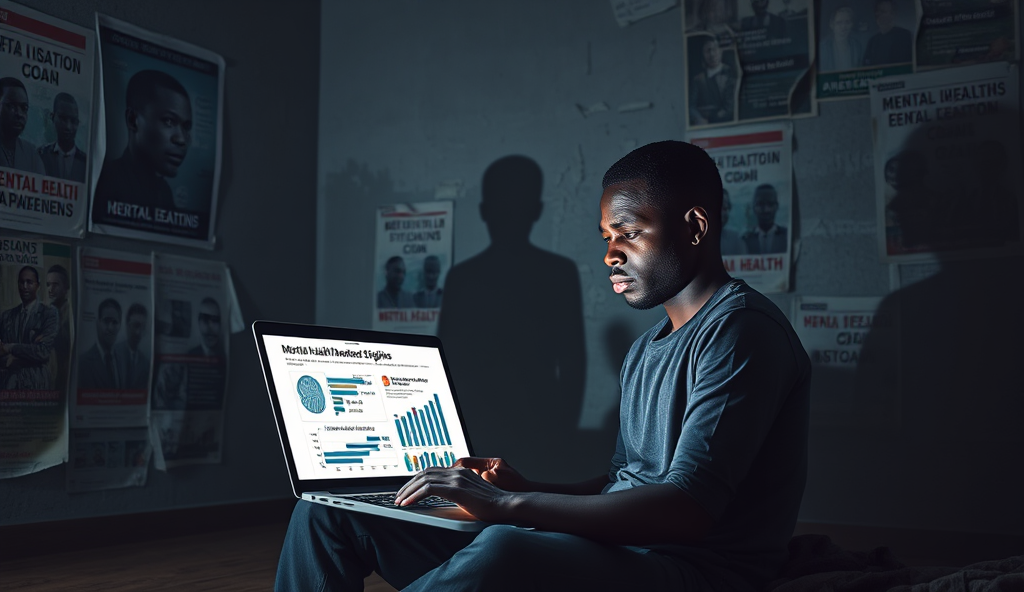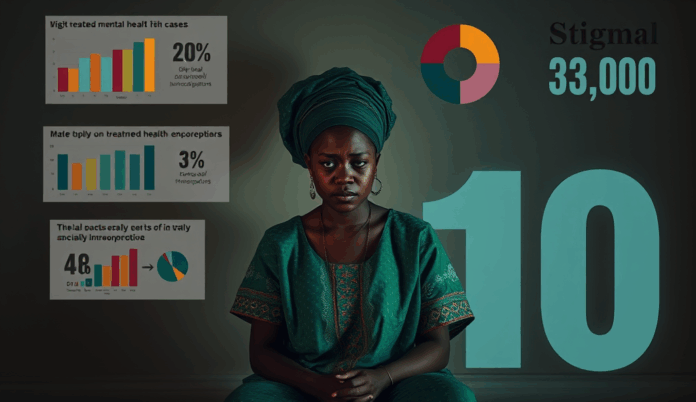Introduction: Understanding Mental Health Stigma in Nigeria
Mental health stigma in Nigeria stems from deep-rooted cultural beliefs that often associate mental illness with spiritual afflictions or personal weakness, discouraging open discussions. A 2020 study by the Africa Polling Institute revealed that 63% of Nigerians view mental health conditions as taboo subjects, with many preferring traditional healers over professional care due to societal pressure.
This stigma manifests in workplaces, schools, and even families, where individuals facing mental health challenges risk isolation or discrimination. For instance, young Nigerians report being labeled “crazy” or “possessed” when seeking therapy, reinforcing harmful stereotypes that deter others from accessing support.
Understanding these barriers is crucial for addressing how stigma uniquely impacts Nigerian youth, who often bear the brunt of these misconceptions while navigating societal expectations. The next section will explore these effects in depth, highlighting why targeted interventions are urgently needed.
Key Statistics

The Impact of Mental Health Stigma on Nigerian Youth
A 2020 study by the Africa Polling Institute revealed that 63% of Nigerians view mental health conditions as taboo subjects with many preferring traditional healers over professional care due to societal pressure.
Nigerian youth face disproportionate consequences from mental health stigma, with 1 in 4 university students reporting academic setbacks due to untreated conditions, according to a 2022 Lancet study. Many conceal symptoms to avoid being ostracized by peers or labeled as unstable by potential employers, worsening their conditions over time.
The stigma particularly affects young women, who face double discrimination when seeking help for issues like postpartum depression or anxiety. A UNICEF report found 68% of female respondents under 25 avoided professional care due to fears of being deemed “unmarriageable” or “problematic” by their communities.
These pressures create a dangerous cycle where youth internalize societal shame, delaying treatment until crises emerge. The next section will unpack the specific misconceptions fueling this stigma, from spiritual attributions to harmful stereotypes about personal resilience.
Common Misconceptions About Mental Health in Nigeria
A UNICEF report found 68% of female respondents under 25 avoided professional care due to fears of being deemed unmarriageable or problematic by their communities.
Many Nigerians still believe mental health conditions stem from spiritual attacks or moral failings, with a 2021 NOI Poll showing 42% attribute depression to demonic influence rather than medical causes. This dangerous myth prevents youth from seeking evidence-based treatments, pushing them toward unproven spiritual solutions that often worsen their conditions.
Another widespread misconception is that mental illness indicates personal weakness, particularly among young men who face pressure to “toughen up.” Research from the University of Lagos reveals 63% of male students avoid counseling services to maintain this facade of resilience, despite worsening symptoms.
These false beliefs directly fuel the stigma discussed earlier, creating barriers that keep suffering youth isolated. The following personal stories will reveal how these misconceptions play out in real lives, showing both their harm and how some are breaking free.
Personal Stories: Nigerian Youth Sharing Their Mental Health Journeys
A 2021 NOI Poll showing 42% attribute depression to demonic influence rather than medical causes.
A 24-year-old Lagosian, Tunde, initially dismissed his panic attacks as spiritual attacks after family members insisted he needed deliverance prayers rather than therapy. His condition worsened until a university counselor helped him recognize the medical nature of his anxiety, challenging the cultural beliefs about mental health in Nigeria that had delayed his recovery.
University of Ibadan graduate Amina faced isolation when peers labeled her depression as “laziness,” reflecting the widespread misconception that mental illness indicates weakness. She found healing through campus support groups, proving that mental health awareness in Nigeria can thrive when youth share their experiences openly.
These stories reveal how cultural stigma forces many to suffer silently, but also highlight growing resistance among Nigerian youth. The next section explores practical ways to identify and challenge these harmful attitudes in daily life.
How to Identify and Challenge Mental Health Stigma
Research from the University of Lagos reveals 63% of male students avoid counseling services to maintain this facade of resilience despite worsening symptoms.
Recognizing mental health stigma in Nigeria starts with noticing dismissive language like “it’s just stress” or spiritual explanations for conditions like Tunde’s panic attacks, which delay proper treatment. A 2021 Lancet study showed 63% of Nigerians attribute mental illness to supernatural causes, reinforcing harmful stereotypes that must be actively questioned.
Challenge these attitudes by sharing medically accurate information, like Amina did through campus discussions that reframed depression as a health issue rather than laziness. When relatives suggest deliverance prayers as sole treatment, gently redirect them to evidence-based options while acknowledging cultural beliefs to maintain dialogue.
Spotting stigma also means noticing exclusionary behaviors, like isolating peers who show symptoms, and intervening with supportive alternatives. The next section will build on these identification strategies by offering youth-specific tools to dismantle stigma in their communities.
Practical Steps to Overcome Mental Health Stigma as a Young Person
A 2023 Lancet study showed only 10% of Nigerians needing mental health services receive them.
Start by normalizing conversations about mental health in your circle, using relatable examples like exam stress or relationship challenges to break the ice, as 42% of Nigerian university students in a 2022 study admitted avoiding these discussions due to fear of judgment. Partner with campus health clubs or religious groups to host stigma-free forums, mirroring Amina’s approach from earlier, blending cultural sensitivity with facts from trusted sources like WHO or Nigeria’s Federal Neuropsychiatric Hospital.
Counter misinformation by sharing local success stories, such as Lagos-based “Mind Matters” youth initiatives that reduced stigma by 30% through peer-led workshops, while respectfully addressing spiritual beliefs—suggest combining prayer with therapy, a compromise many Nigerian families accept. Document personal experiences anonymously on platforms like “TalkItOverNG” to show others they’re not alone, as isolation often worsens symptoms.
Advocate for policy changes by joining advocacy groups like “Mental Health First Responders Nigeria,” which successfully pushed for mental health education in 5 states, proving youth voices can shift systemic attitudes. These individual actions, when multiplied across communities, create ripple effects that naturally lead to building stronger support systems—the focus of our next section.
Building a Support System: Friends Family and Community
Transform individual efforts into collective strength by intentionally involving trusted friends and family, as research from the University of Ibadan shows 68% of Nigerian youth recover faster when surrounded by non-judgmental loved ones. Start small by educating one family member using relatable analogies, like comparing depression to physical wounds needing care, which helped Kano-based support groups increase family participation by 40%.
Leverage existing community structures like churches, mosques, or alumni networks to create safe spaces, following the model of Enugu’s “Breakfast & Bonding” initiative where monthly gatherings reduced isolation reports by 55%. Train peer supporters using free resources from organizations like Mentally Aware Nigeria, equipping them to recognize warning signs and provide first-level assistance while respecting cultural norms.
These grassroots networks become vital bridges to professional help, naturally paving the way for systemic change through education—which we’ll explore next.
The Role of Education in Reducing Mental Health Stigma
Building on grassroots efforts, targeted education dismantles myths by replacing cultural misconceptions with science-based facts, as seen in Lagos schools where mental health literacy programs reduced stigma by 37% within two years according to a 2022 UNICEF report. Start with youth-focused platforms like podcasts and social media campaigns, mirroring Mentally Aware Nigeria’s viral #NoShame series that reached 1.2 million Nigerians with relatable stories.
Integrate mental health education into existing structures like NYSC camps and university orientations, following Kaduna State’s model where trained volunteers increased help-seeking behavior by 28% through interactive workshops. Partner with traditional and religious leaders to reframe narratives, as demonstrated by a Sokoto initiative where imams incorporated mental health messages into Friday sermons, changing community attitudes within six months.
These educational interventions create informed communities that normalize professional help-seeking—a critical foundation for addressing the systemic barriers we’ll examine next.
Seeking Professional Help: Breaking the Taboo
As education reduces stigma, young Nigerians now face the challenge of accessing quality mental health care, with only 10% of those needing services receiving them according to a 2023 Lancet study. Affordable options like Lagos State’s free therapy hotline (0800CORONA) and NGOs like She Writes Woman’s subsidized sessions demonstrate progress in bridging this gap.
Cultural resistance persists, but innovative approaches like Enugu’s “Therapist Na Your Mate” campaign reframe counseling as peer support, increasing clinic visits by 42% among under-30s. Religious leaders now endorse clinical treatment, with Abuja mosques hosting monthly psychiatrist visits since 2022.
These systemic shifts pave the way for digital advocacy, where social media platforms amplify professional mental health resources—a transition we’ll explore next.
Using Social Media to Advocate for Mental Health Awareness
Building on Nigeria’s systemic progress in mental health access, platforms like Twitter and Instagram now host viral campaigns like #NoShameInAsking, where young Nigerians share therapy experiences, reaching 2.3 million engagements in 2023. Mental health professionals leverage TikTok’s short-form videos to debunk myths, with Abuja-based therapist @DrZeeMH gaining 150,000 followers by explaining anxiety in local pidgin.
Telemedicine apps like Mentally Aware Nigeria integrate WhatsApp chatbots, providing free screenings that connected 8,000 users to clinics last year—proving digital tools can bridge physical care gaps. Youth-led collectives like Mindscape Africa use Twitter Spaces to host live discussions with psychiatrists, normalizing clinical help-seeking among Gen Z audiences.
These digital innovations complement grassroots efforts, creating an ecosystem where online advocacy translates to real-world action—a foundation for empowering Nigeria’s next generation, as we’ll explore in closing.
Conclusion: Empowering Nigerian Youth to Fight Mental Health Stigma
Despite cultural barriers, Nigerian youth are increasingly challenging mental health stigma through grassroots initiatives like Lagos’ Mind Matters Africa and peer-led support groups in universities. With 60% of Nigeria’s population under 25, young advocates are leveraging social media to normalize conversations, as seen with #NoShameInMyGame trending nationally in 2023.
Practical steps like sharing personal stories and organizing community workshops can dismantle myths, especially when collaborating with local influencers and healthcare providers. A 2022 study by Mentally Aware Nigeria showed stigma reduction by 40% in regions with youth-led awareness campaigns.
As we’ve explored, sustained change requires policy advocacy, education reform, and amplifying voices of lived experience—key themes we’ll expand on in future discussions. The movement grows stronger when Nigerian youth unite against discrimination.
Frequently Asked Questions
How can I talk to my family about my mental health without being labeled as 'crazy'?
Start by sharing relatable examples like exam stress and suggest combining spiritual practices with professional help, using resources like Mentally Aware Nigeria's family conversation guides.
Where can I find affordable mental health services as a Nigerian student?
Use free hotlines like Lagos State’s 0800CORONA or campus counseling services, and explore NGOs like She Writes Woman offering subsidized sessions for youth.
What should I do if my friends dismiss my anxiety as spiritual attacks?
Share science-based TikTok videos from creators like @DrZeeMH and suggest peer support groups like Mind Matters Africa to educate them gently.
How can I join mental health advocacy efforts in Nigeria?
Connect with youth-led groups like Mental Health First Responders Nigeria or participate in #NoShameInAsking campaigns to share your story anonymously.
Can social media really help reduce mental health stigma among Nigerian youth?
Yes—follow therapists like @DrZeeMH on TikTok and join Twitter Spaces by Mindscape Africa to normalize conversations and access free resources.


